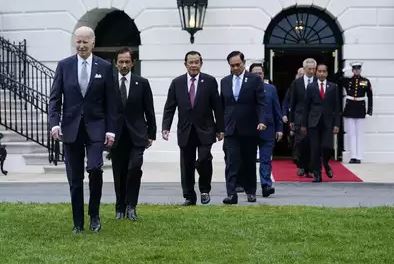The President of the United States, Joe Biden, is attempting to persuade the leaders of southeast Asian nations to speak out more forcefully against Russia’s invasion of Ukraine; however, this remains a touchy subject for many members of the region’s 10-country alliance that have close ties to Moscow.
The first meeting of the Association of Southeast Asian Nations to be held in Washington in the organization’s 45-year history was kicked off on Thursday night with an intimate dinner hosted at the White House by President Biden for leaders from the Association of Southeast Asian Nations (ASEAN).
While the administration has been concentrating its efforts on the conflict in Ukraine, the White House is also making an effort to indicate that it is increasing its presence in the Pacific. It was reported that the United States will contribute to new projects totaling more than 150 million USD to strengthen Southeast Asia’s climate, marine, and public health infrastructure.
Biden is aware, however, that it may be difficult to reach an agreement with the members of ASEAN over the Russian invasion.
On Thursday, the press secretary for the White House, Jen Psaki, stated that Ukraine would be on the agenda for the leaders’ discussions; however, she was unable to speculate as to whether or not the group would mention the Russian invasion in the communique that would be issued following the summit.
For many years, Russia has been an important source of military equipment for a few ASEAN states, including Vietnam, Myanmar, and Laos. The alliance has refrained from making any criticisms of President Vladimir Putin or of Russia’s conduct of the conflict, with the exception of Singapore, which is the only member of the 10-member organisation to have imposed direct sanctions against Moscow. Singapore is also the only nation to have done so.
Indonesia has been circumspect in the public remarks it has made on the invasion, and like the Philippines, it has made it quite apparent that it would not impose sanctions against Russia. Although it participated in a vote at the United Nations against the invasion of Ukraine, Thailand has steadfastly maintained its posture of neutrality throughout the conflict.
On Friday, high-level discussions were supposed to take place at the State Department, and President Biden was slated to deliver a speech to the assembled guests.
Brunei, Cambodia, Indonesia, Laos, Malaysia, Singapore, Thailand, and Vietnam are all members of the Association of Southeast Asian Nations (ASEAN). The highest-ranking officials from the ASEAN member country Myanmar were not permitted to attend, and the departing Philippine president, Rodrigo Duterte, sent Foreign Affairs Secretary Teodoro Locsin Jr. to represent his administration at the meeting.
The conference takes place before President Biden’s journey to South Korea and Japan the following week, which will be his first trip to Asia in his current role as president. During his tour, he will not only meet with the presidents of those two nations but also leaders from the Indo-Pacific strategic alliance known as the Quad, which is comprised of the United States of America, India, and Japan. He will conduct discussions with the leaders of both of these nations.
In the early stages of his administration, President Biden has made an effort to improve ties with countries located in the Pacific region. He does so because he views a growing China as the most dangerous economic and national security foe to the United States.
However, his effort to recalibrate US foreign policy has been challenged by the most severe fighting in Europe since World War II. This conflict has occurred since the end of the Second World War.
The United States’ new investment in ASEAN countries, which was announced at the beginning of the summit on Thursday, includes USD 60 million for a new regional marine programme, USD 40 million for sustainable energy infrastructure, and USD 6 million to promote digital growth in the region.
The White House also announced that the School of Advanced International Studies at Johns Hopkins University will launch a privately funded institute for rising leaders from ASEAN nations. This institute will bring mid-career public sector officials to the United States for leadership training. It will target rising leaders from ASEAN nations.
Since Myanmar has been in a state of turmoil since since the military overthrew the elected government of Aung San Suu Kyi in February 2021, ASEAN has prohibited the country from sending any officials, other than nongovernmental leaders, to meetings of ASEAN.
The administration of President Joe Biden voiced its disapproval of the military takeover that led to the removal of Aung San Suu Kyi. In the first of multiple corruption charges that have been brought against her, she was found guilty by a military court last month and given a jail term of five years for her crime. The allegations have been refuted by Suu Kyi.
Because the United States and the members of ASEAN do not share the same views on all issues, the White House’s coordinator for Indo-Pacific Affairs on the National Security Council, Kurt Campbell, stated that the administration anticipates the private talks will be “direct, polite, but maybe a little bit uncomfortable at times.”

